 Howard Beach Credit & Debt Lawyers, New York
Howard Beach Credit & Debt Lawyers, New York
Sponsored Law Firm
-
 x
x

Click For More Info:
-
Law Offices of Gregory Messer
26 Court Street Suite 2400 Brooklyn, NY 11242» view mapBankruptcy & Debt It's Time For A Fresh Start
Experienced bankruptcy attorney Gregory Messer will work with you personally to set your mind at ease and relieve the strain you’re facing from personal or business debt.
800-887-8940
Sponsored Lawyers
1-10 of 43 matches
Bankruptcy & Debt, Bankruptcy, Credit & Debt
Providing debt relief for individual and business clients in the New York City area for more than three decades Gregory Messer, a principal in The Law Offices of Gregory M. Messer, has been practicing bankruptcy law for over 38 years. He represents business and consumer debtors and creditors in Chapter 7, Chapter 11 and Chapter 13 bankruptcy matters. Mr. Messer has the legal acumen needed to handle even the most complex bankruptcy matters for consumers and companies. He frequently receives referrals from other attorneys and past clients who speak highly of his professional abilities. Board Certified in Consumer Bankruptcy Law by the American Board of Certification since 1995, Mr. Messer has been a panel trustee for the Chapter 7 Trustee Panel for the Eastern and Southern districts of New York for 38 years. He has served as a Chapter 11 Trustee, Post Confirmation Trustee and Plan Administrator in various bankruptcy cases. Mr. Messer also served as a Mediator in the United States Bankruptcy Court for the Eastern District of New York.
(more)


 Gregory Messer Brooklyn, NY
Gregory Messer Brooklyn, NY Practice AreasExpertise
Practice AreasExpertise

